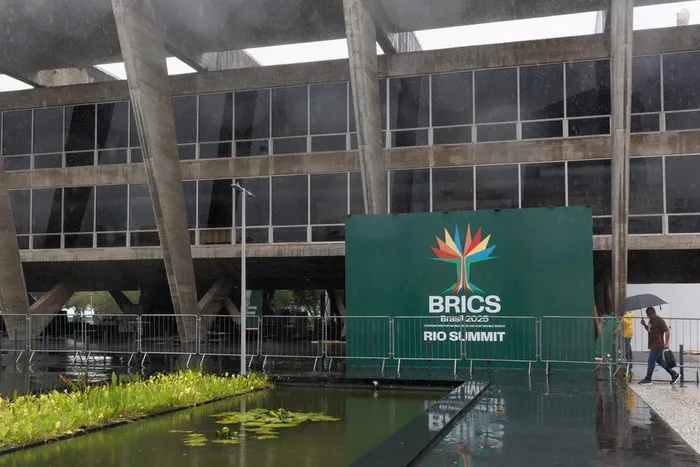
This photo taken on July 3, 2025 shows a logo of the BRICS Summit outside the Museum of Modern Art in Rio de Janeiro, Brazil. The 17th BRICS Summit will be held here from July 6 to 7.
Image: Xinhua
Does BRICS Have an Ideology?
BRICS has become one of the most talked-about formations on the global stage. Described as a counterweight to Western dominance, a champion of the Global South, or a pragmatic coalition of emerging powers, it raises a vital question: does BRICS actually have an ideology?
The answer is layered. BRICS is not an ideological bloc. It is a geopolitical coalition, a space where countries with different political systems, economic strategies, and social realities come together to pursue shared interests. What connects them is not a common vision of the world, but a shared dissatisfaction with how global power has been concentrated for decades in the hands of the United States, Europe, and the institutional networks that have shaped global governance – notably NATO, the IMF, the World Bank, and the broader Bretton Woods system. BRICS provides a platform to push back against this order, while opening debate on how economic and political systems might evolve outside Western hegemony.
At its heart, BRICS advances the principle of multipolarity – a geoeconomic arrangement that challenges the idea of a single global centre of power. It champions sovereignty, non-interference, fairer trade, and stronger representation for developing countries in global institutions. For much of the Global South, these demands are a response to long histories of colonisation, resource extraction, debt dependency, and exclusion from decision-making. The BRICS reformist drive to challenge and reshape the IMF, World Bank, and the broader Bretton Woods framework is central to this moment, alongside building alternative institutions such as the New Development Bank (NDB), signalling a desire to redistribute not only global influence, but also the terms of development, debt, and investment.
Yet a deeper question emerges: how will this new economic arrangement touch the lives of ordinary people, the masses already dispossessed through austerity, inequality, and structural adjustment programmes imposed under the old order? How will it ensure that prosperity does not remain confined to elites but filters down to uplift the many?
Each BRICS+ country offers a unique social landscape. Brazil is a powerhouse of agricultural production and industry, yet its indigenous peoples and rural communities face land dispossession and environmental pressure. Urban centres flourish, but inequality persists. India’s digital and industrial growth is remarkable, yet caste hierarchies and rural poverty continue to shape life for hundreds of millions. Russia brings energy strength, geopolitical influence, and a commitment to multipolar partnerships, while also confronting regional disparities and social challenges – yet its strategic role within BRICS positions it as a bridge-builder, especially through energy, infrastructure, and security cooperation.
China stands out for its vast poverty alleviation achievements, lifting hundreds of millions out of extreme poverty over recent decades through state-led planning, large-scale investment, and targeted social programmes. This is not only a technical achievement but a social transformation that challenges the idea that global integration must leave the vulnerable behind. South Africa brings the symbolic and moral weight of its anti-apartheid struggle, but its post-liberation economy remains marked by white monopoly capital and a comprador elite that has not yet delivered meaningful redistribution to the majority. Land, employment, and economic inclusion remain unfinished work. The Gulf states contribute energy wealth and sovereign funds but come with monarchic and theocratic systems that raise new questions for social policy.
In looking to ethical and philosophical guidance, BRICS might draw on its members’ cultural foundations. China’s traditions, including Taoist ideas of harmony, social balance, and care for the collective, could inform models of development that go beyond profit. Africa offers ubuntu, an ethic of human interconnectedness, dignity, and collective well-being, alongside the political tradition of Pan-Africanism, which calls for solidarity, sovereignty, and justice among historically marginalised peoples.
There are examples from history worth studying. Libya, under Muammar Gaddafi, developed a social model that channelled oil wealth into free healthcare, education, housing, and basic income, aiming to circulate resources directly to the population. This system was violently cut short not by internal collapse, but by US and NATO intervention, which destroyed a social contract rare in the region. China’s experience shows how state-directed development can change the life chances of hundreds of millions, challenging neoliberal claims that markets alone can deliver inclusion.
Perhaps it is time for BRICS to imagine a shared philosophical and ethical document – not a rigid ideology, but a framework drawing from the humanistic principles embedded in each member’s traditions. Such a document could act as a soft guide, ensuring that the push for global reform is matched by a commitment to uplift the masses: to translate multipolar ambition into concrete gains in livelihoods, social protection, and dignity. Spiritual and cultural ethics may carry more power in this emerging world order than old ideological slogans.
A BRICS grounded in humanist principles could become more than a geopolitical counterweight – it could offer a vision of sovereignty, solidarity, and shared flourishing that speaks not only to states, but to people.
**Gillian Greer Schutte is an award-winning South African filmmaker, writer, and critical race theorist whose work bridges media, politics, and social justice. An honorary lecturer at Wits University’s Graduate School of Public and Development Management, she has produced globally used hypermedia and film case studies in collaboration with the Harvard Kennedy School of Government. Widely published in academic journals and international newspapers, her work interrogates poverty, geopolitics, extractive mining, and neoliberal economics across the Global South, with documentaries and hybrid films that challenge dominant narratives and amplify marginalised voices.